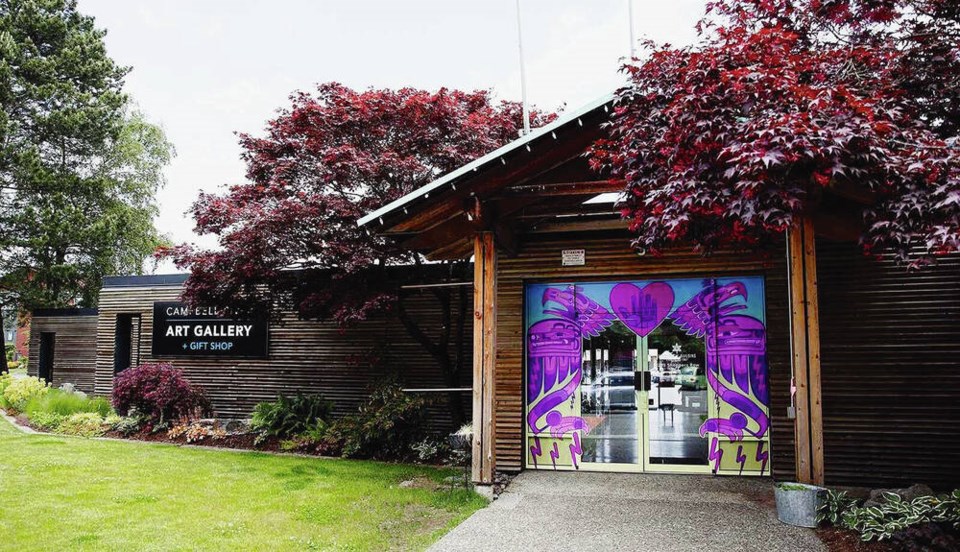Campbell River’s non-profit art gallery fears it might have to shut its doors because council is set to reject its annual bid for a tax exemption and might not approve a major city grant, after the gallery was described as operating in a “poor neighbourly manner.”
At a council meeting last week, Coun. Ron Kerr accused the gallery and Vancouver Island Mental Health Society — which runs a supervised injection site and a sobering and assessment centre — of “having significant negative effects on our downtown community.”
In terms of the art gallery, the problem seems to stem from the fact that the building’s architecture features an awning-type structure that has become a popular place for the unhoused to seek shelter at night.
Sara Lopez Assu, art gallery executive director, said people were sleeping under the awnings when she took the job at the gallery in 2020.
As the housing and opioid crises have exploded in Canada, the number of people who go into those spaces at night has grown, she said.
People move under the awnings when the gallery is closed, she said. “As a public art gallery, there’s absolutely nothing we can do about that. We are not social workers. We are not security guards. We are not bylaw officers. We are not city staff,” Lopez Assu said.
Those connected to the gallery treat unhoused people respectfully, which some council members seem to think encourages them to congregate, she said.
“It’s baffling because obviously it makes absolutely no sense.”
The gallery holds an open studio program for members of the street population. Usually about six to eight people show up, she said.
Kerr said the local visitor information centre moved out of the building it shared with the art gallery because of behaviours happening around that site. “This is one very clear example of the effect of a bit of a poor neighbour policy with the immediate neighbour.”
Downtown businesses are being affected and visitor numbers are dropping, he said.
A count this year found 197 people unhoused or without secure housing in the city of slightly more than 38,000.
A majority of council supported Kerr’s amendments to the tax exemption bylaw, dropping the art gallery and mental health society from the list of exempted organizations. The bylaw went to third reading but must still receive final approval.
Coun. Ben Lanyon noted that the Centennial building housing the art gallery is owned by the city and provided at “zero cost” to the facility.
Coun. Tanille Johnston, who voted against Kerr’s amendments, said it’s not the responsibility of a non-profit society or a business owner to take on the role of bylaw officers.
“Our gallery has been getting some pretty awesome recognition,” she said. “I think their engagement with certain populations is actually keeping people off of the street and putting them into spaces and places where they can do meaningful work that is helping them with their journey in trying to get to a better place.”
Johnston said she did not understand Kerr’s strong language in relation to the art gallery.
The Campbell River Art Gallery is next door to the city’s Spirit Square, where many of unhoused people spend their time.
The 30-year-old art gallery was set to receive $9,810 in a permissive tax exemption. The mental health group has applied for $17,114.
Lopez Assu pointed out that a community review committee recommended to council that the application for a tax exemption be approved.
She has distributed a letter to community members asking them to contact council expressing support for the tax exemption request, saying the loss of the exemption would have a “significant financial impact on our organization.”
Lopez Assu is concerned that the vote against a tax exemption may signal that the city will not look favourably at the gallery’s upcoming application for a grant of about $80,000.
If that application is also turned down, “it would render us incapable of opening our doors.”
Lopez Assu disputes the characterization of the art gallery as being a bad neighbour, saying the gallery works with other organizations to enliven the downtown are and encourage people to visit the core.
Taryn O’Flanagan, executive director of the Nanaimo-based mental health society, said the society works with its neighbours and tries to address issues promptly, which is why she was surprised to hear her organization accused of not addressing concerns about disorder downtown.
She, too, is encouraging council members to reverse course and grant the tax exemption.
O’Flanagan and Lopez Assu each said they were not given any indication the issue would be raised at last week’s council meeting.
The bylaw and its amendments come before council on Oct. 12. Public comments can be sent to [email protected] or to City Hall, 301 St. Ann’s Rd., by by 4 p.m. October 11.



